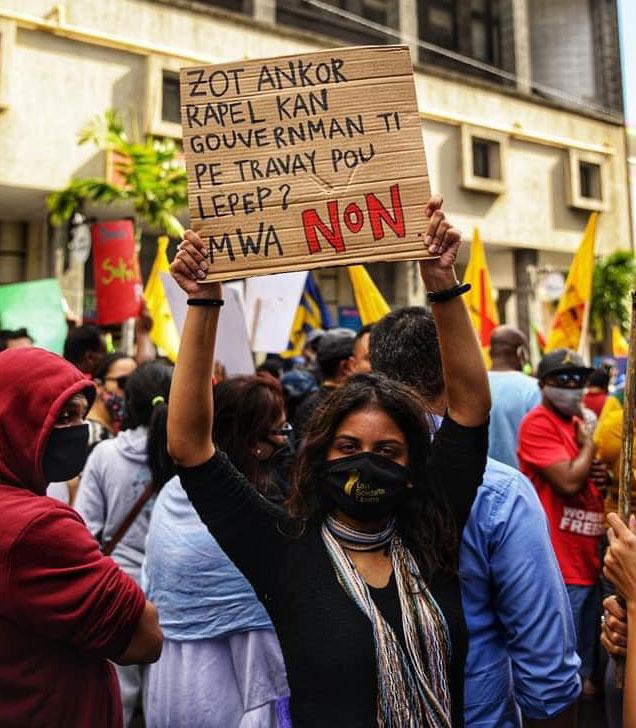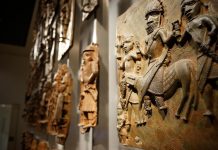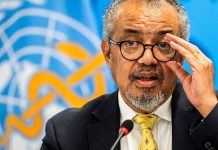Africa-Press – Mauritius. After a long time, the country saw a popular demonstration on Saturday July 11 in protest against the measures taken by the Government in the wake of the pandemic.
Bringing together trade unions and non-governmental organizations (NGOs), this event was organized under the aegis of the Kolektif Konversasyon Solider (KKS) movement to send a strong signal to power and employers.
The signal: the mass of workers are tired of being taken for willing victims of a policy of selective austerity. Does this demonstration mark the beginning of a popular mobilization or is it a cyclical event whose pyschological effects will fade over time?
To strike the popular imagination, the demonstration wanted to be apolitical (hence the absence of the leaders of the main opposition parties) and aimed to unite around the unifying themes of unions and NGOs, which for once have put aside their disputes to agree on a common platform.
Objectively, despite the inaccurate and biased report by the MBC, the organizers managed to get a significant number of people to take to the streets to make their voices heard.
This is all the more salutary as the public faces a climate of fear in the wake of the freedom-killing laws which aim to criminalize the crime of information (objective but embarrassing) and the crime of opinion. Fright background Freedom of expression faces significant barriers these days.
In addition to Internet users who are systematically monitored by the police or sometimes taken to court for the slightest prank, opinion leaders and other reckless intellectuals who freely give their opinion on current affairs in the media are subject to questioning or disciplinary investigations which do not do justice to citizen democracy.
Should we also recall the sanction (temporary suspension of transmission) imposed several times on a private radio station which dares to address controversial themes? In this context of fear, the decision to organize a demonstration was therefore a risky bet.
The bet has been successful, the question now is whether the unions and NGOs will manage to maintain a sustained level of mobilization in order to gain recognition for their message and generate popular support for their struggle.
Will keyboard warriors of all stripes remain anonymous behind their computer screens or will they come forward in solidarity with the victims of the austerity measures?
Elsewhere in the world, we see daily demonstrations against racial injustice (‘Black Lives Matter’ in the United States, Canada and Europe), the ‘Gilets Jaunes’ movement against austerity in France, the popular revolt against China’s stranglehold on the political-economic system in Hong Kong, and so on.
Popular mobilization Mauritius has lost its tradition of union and labor mobilization a long time ago. The last major union mobilization dates back to 1979 when union members in the sugar industry went on strike to demand better working conditions.
In the 1970s and 1980s, certain parties (MMM and PMSD in particular) had union roots in certain sectors (port, free zone, sugar industry, public services) which sometimes enabled them to mobilize the masses.
Further on, in the 1940s and 1960s, the Labor Party had close relations with trade unions, which secured it popular foundations. This symbiosis between unions and political parties is over.
The relationship between political parties and workers is now that which exists between elected officials and voters. The lack of social movements that mobilize the public on unifying themes is the result of several factors.
Over the past decades, a political consensus has developed between the traditional parties in favor of neoliberal economic policy based on light taxation (now regressive in favor of the rich), market deregulation and business facilitation.
In the absence of ideological contradiction between them, the parties fall back on political patronage to gain support. If there is any alternation, it is based on the premise of offering an alternative method of cleaner public administration without questioning the system.
The end of ideologies has removed from the political field all idealism and all national-scale reflection on a social project. A strong and active civil society is lacking in Mauritius.
The various movements present are crossed by philosophical contradictions between them (Rezistans ek Alternativ, Lalit, May Day Movement, Platform for the Environment) while the think tanks (Sime Lalimier, Smart Citizens, Think Mauritius) operate in isolation.
The parties themselves have co-opted trade unionists and opinion leaders as candidates for the elections, which weakens public confidence in these people.
The type of development focused on the race for easy money and overconsumption has created among Mauritians a sense of individualism and hence the refusal of any solidarity with the most vulnerable.
Thus, the Government expels squatters housed on state land in full containment without moving anyone. Identity folds against a backdrop of political patronage have favored ethno-religious groupings which prevent any inter-community synergy in reflection and action on national issues.
The supposedly apolitical unions have become corporatist entities that strictly defend the interests of their members, so lacking in national perspective. Sometimes the interests of unions are in conflict.
For example, public sector unions, whose employees are more privileged with the five-year salary review and their tax-free facilities, rarely show solidarity with their private sector counterparts.
As proof, they remained silent on the Generalized Social Contribution (CSG), a measure that will have an impact only on private sector employees and self-employed workers.
The CSG proposed by the government is discriminatory in nature in that it will be levied only on private sector employees (replacing contributions to the National Pension Plan) in order to finance pensions which will be granted to all, including public sector employees. Crucial opportunity
The economic impact of the pandemic offers the opportunity for unions and NGOs to federate employees, self-employed workers and others left behind around a common platform of demands, whether it concerns the protection of employment, guaranteed wages, consumer rights, the preservation of natural ecosystems against all-out land development projects, and the defense of civil liberties.
The pandemic not only exacerbated economic precariousness for a large majority, but it also accentuated economic inequalities with the Government’s reaction in terms of new public policies.
We wonder if there is a proactive policy of the State to favor big business with rescue plans with billions of rupees [Rs 80 billion to be injected into the economy by the Mauritius Investment Corporation (MIC) without no transparency on the recipients of public aid] or whether the state is the willing hostage of capitalism.
In any case, the award of contracts for the supply of drugs and medical equipment with a total value of Rs 1.5 billion without any call for tenders, under the pretext of the health emergency, to companies of the most opaque would testify to an undeniable nepotism or flagrant patronage.
Claims Given the major post-Covid issues, civil society is called upon to organize and mobilize to support national demands that transcend political, social or ethnic divisions. If some parties want to support it, they will step into a democratic movement.
Already, the organizers of the solidarity demonstration have drawn up a list of demands which indicate a certain awareness of the current problems, including:
the immediate introduction of a universal wage of Rs 12,500 to any unemployed citizen;
a legal guarantee against loss of employment for a certain period following the injection of funds into the economy by the MIC;
the imposition of a wealth tax with a progressive tax system to ensure real national solidarity;
the freezing of the abolition of the National Pensions Fund and its replacement by the CSG;
the establishment of a national commission, comprising representatives of the parliamentary and extra-parliamentary opposition, trade unions, women, young people and citizens;
freezing hotel construction and ecological restoration where necessary; and
the abolition of political interference and the police commissioner in health and public health decisions. These demands constitute a basic platform which deserves a broad debate.
For More News And Analysis About Mauritius Follow Africa-Press







